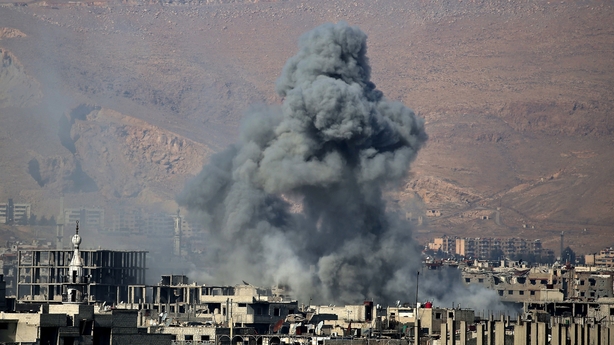The United States is "extremely concerned" about reports that Syrian forces recently used chlorine gas in an attack on the eastern Ghouta area, which caused more than a dozen people to fall ill.
Senior US officials claimed the Syrian government may be developing new types of chemical weapons.
They also said that President Donald Trump is prepared to again order military action against Syrian leader Bashar al-Assad's forces if necessary to deter chemical attacks.
Mr Trump ordered missile strikes against a Syrian air base last April in response to alleged chemical weapons attacks on rebel areas.
The officials reiterated US Secretary of State Rex Tillerson's recent accusation that Russia, Mr Assad's ally in Syria's multi-sided civil war, bears some responsibility for failing to enforce the chemical weapons ban.
Russia has denied any complicity and the Syrian government has said it has not carried out any of the attacks.
Mr Assad is believed to have secretly kept part of Syria's chemical weapons stockpile, despite a US-Russian deal under which Syria was supposed to have handed over all such weapons for destruction in 2014.
Mr Assad's forces have instead "evolved" their chemical weapons and made continued occasional use of them in smaller amounts since the attacks last year, the officials told reporters in a briefing.
Characteristics of some of those recent attacks suggest that Syria may be developing new weapons and methods for delivering poison chemicals, possibly to make it harder to trace their origin, the officials said, speaking on condition of anonymity, but they declined to provide specifics.

A deadly sarin attack on a rebel-held area in April prompted Mr Trump to order a missile strike last year on the Shayrat airbase, from which the Syrian operation is said to have been launched.
"We reserve the right to use military force to prevent or deter the use of chemical weapons," one official said, while declining to specify how serious a chemical attack would have to be to draw a fresh US military response.
A second official said, however, that the Trump administration hopes that stepped-up international sanctions and diplomatic pressure will help rein in Mr Assad's chemical weapons programme.
If the international community does not act quickly to tighten the screws on Mr Assad, Syria's chemical weapons could spread beyond its borders and possibly even "to US shores," the second official claimed.
"It will spread if we don't do something," the official warned.
The US officials also said Islamic State militants have sporadically used chemical weapons, such as sulfur mustard and chlorine, some via improvised explosive devices.

